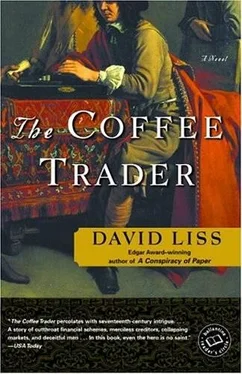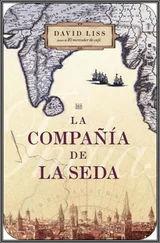I still thought nothing of the matter. Sooner or later every man found himself standing before that council: a rumor of unclean food eaten or a Dutch slut got with child. The council itself was little better than a pack of old women, wanting only a soothing word to make them calm again. I knew that my old enemy, Solomon Parido, now held a place on the council, but I hardly thought he would use his power for nefarious ends.
Yet that is precisely what he did. He sat there, stiff in his laced suit, glaring at me. “Senhor Alferonda,” he said, “you are surely aware of the ruling of the council that no help shall be given to the Tudescos other than through the charitable boards of the synagogue.”
“Of course, senhor,” I said.
“Then why have you ensnared men of our nation, law-abiding men, into your wicked schemes of jewel peddling?”
“My wicked schemes, as you style them, provide aid to the poor. And while you have made it clear that you do not want us throwing our coins to Tudesco beggars, you have said nothing about buying and selling with them.”
“Is it not the same as tossing coins if you intentionally ask merchants to give more than they wish to pay that the seller might take that money and do with it as he will?”
“As he will,” I pointed out, “often means buying bread.”
“That is not your concern,” one of the other members of the council said. “There are charitable boards to see that these people don’t starve.”
The offense was minor enough, but Parido wished to cast it in the most dire light possible. He turned the other parnassim against me. He prodded me into speaking angrily. And yet, though I saw all that, I could not help but be angry. I had done nothing wrong. I had violated none of the holy laws. Indeed, I upheld the commandment to give charity. Was I now to be punished for doing as the Torah commands? This question, in particular, may have been what set them against me. No one likes to have his hypocrisy exposed.
After much interrogation, the parnassim asked me to wait outside. When they called me back in, after more than an hour, they announced their decision. I was to ask the men for whom I had brokered to rescind their sales. They were, in other words, to buy back their stones.
I had seen the men for whom I had brokered. They were poor, dressed in rags, crushed by hardship and despair. Many had lost parents or children or wives to the cruelty of Poles or Cossacks. To go to them and ask them to return money, which they surely no longer had because they had spent it rather than starve or go naked, seemed to me not only preposterous but depraved. I supposed it was meant to be so. To undo these sales, I would have to buy those stones back with my own money, and surely Parido had known I would refuse to do so.
The council urged me to reconsider, but I swore I would never obey such an unreasonable demand. The parnassim then told me I had forced their hand and they had no choice but to put me under cherem, the ban-to excommunicate me.
Men fell under the ban frequently. Most times it was but for a day or a week but in some it was permanent. And so they meant it in my case. More than that, Parido made it clear to the Tudescos that if they admitted me into their synagogue they would be made to suffer for their kindness. He wrote to the Ma’amads of every community upon the face of the earth, giving them my name and speaking of my crimes in the most exaggerated terms. I had become an outcast with nowhere to go, the mark of Cain upon me.
They chose to treat me like a villain. What choice did I have but to become one in earnest?
Miguel first met Geertruid nearly a year before she proposed a venture in coffee. It was in the Flyboat, a tavern off the Warmoesstraat, close enough to the Exchange that merchants regarded it as adjunct, a place to continue business when the gates of the bourse closed. Though owned by a Dutchman, it catered to Jewish traders by offering drinks that conformed to the dietary codes. Jewish boys of the Portuguese Nation were hired to keep separate the serving glasses for the Jews and to clean them in accordance with Jewish law, and a rabbi would occasionally come to inspect the kitchens, strolling like a general with his hands behind his back as he peered into cabinets and pried open containers. The owner charged almost twice the going rate for wine and beer, but Jewish merchants gladly paid higher prices in exchange for the chance to conduct business in a Dutch tavern with an easy conscience.
Miguel had been continuing a conversation with a sugar merchant after the close of the Exchange, and the two men had taken a table and talked of their business for hours, all the while drinking with Netherlandish intensity. The sugar merchant was one of those good-natured Dutchmen who found Jews fascinating, as though their alien beliefs and customs made them a puzzle. The Vlooyenburg crawled with these men, who came to learn Hebrew or study Jewish theology, in part because it helped them better to understand their own religion but also because the Dutch were curiously attracted to foreigners. The Ma’amad’s strict injunction against religious debate with gentiles made Miguel only more irresistible, and the merchant had bought drink after drink, with the playful intention of breaking Miguel’s defenses. At last he abandoned the effort, announcing that he must go home to his wife lest he face her fury.
Warm with beer, Miguel had been in no mood to return to the solitude of his own home, so he remained at his table, quietly drinking while he puffed lazily upon a pipe of good tobacco. Conversations swirled all around him, and he half listened for any useful rumor or tip. Then he heard a fragment of conversation that jolted him out of his stupor.
“… a sad end for the Indian Flower, ” a voice pronounced, with the kind of narrative fervor only to be found on the lips of a drunk Dutchman. “Cleaned out to her core, until there was nothing left but a pack of unmanned sailors shitting themselves silly.”
Miguel turned slowly. He owned shares in the Indian Flower -quite a few, in fact. Wading through a swamp of boozy confusion, he tried to recall how much he had invested. Five hundred guilders? Seven hundred? Not enough to ruin a man who stood as he had at the time, but well enough that he could not count the loss insignificant, particularly since he had already invested his anticipated profits.
“What did you say?” Miguel demanded of the speaker. “The Indian Flower ?”
He took his first look at the fellow, a grizzled man well into his middle years with the blotchy face of a lifelong sailor. His companions were all the rougher sort of Dutchman who frequented taverns closer to the docks.
“The Indian Flower ’s been taken by pirates,” the older fellow told Miguel. “I heard they were pirates, at any rate. They’re all in service of the Spanish Crown, if you ask me.”
“How do you know this?” Miguel demanded. He twisted his hands, which felt awkward and spongy from too much drink, but his head had already begun to clear.
“I’ve got a mate on the Glory of the Palm, ” the man explained, “which came into dock late this afternoon. He told me the news.”
This afternoon. No one knew yet. He might yet salvage this wreck.
“Have you a particular interest in that ship?” One of the man’s companions spoke. He was younger than the rest, with less of the look of the sea.
“Suppose I have?” He meant no challenge. The two men were testing each other.
“I might be able to offer you my services,” the raggedy trader told him. “By this time tomorrow, word will be out and those shares of yours won’t be good for much more than wiping your ass. But tonight they just might be worth something.”
Читать дальше












